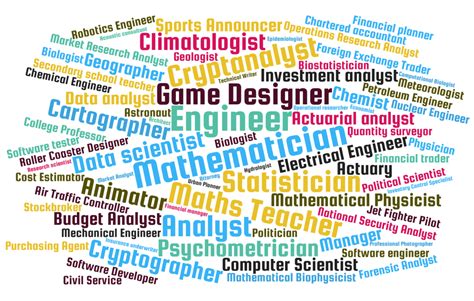Careers In Math

Mathematics is a fascinating and versatile field that opens doors to a multitude of rewarding career paths. With its unique blend of analytical thinking, problem-solving skills, and logical reasoning, a career in math offers an exciting journey into various industries and disciplines. From the world of finance and economics to data science and research, the applications of mathematics are endless. In this article, we will explore the diverse opportunities available to those with a passion for numbers, delving into the specific roles, skills required, and the impact mathematicians have on our world.
Unveiling the World of Mathematical Careers

A career in math is not limited to the traditional image of a mathematician working alone with complex equations. The field of mathematics is vast and ever-evolving, offering a plethora of specialized roles that contribute to different sectors of society. Let’s explore some of the exciting career paths that await individuals with a mathematical mindset.
1. Data Science and Analytics
In today’s data-driven world, the demand for skilled data scientists and analysts is at an all-time high. Mathematicians play a crucial role in extracting meaningful insights from vast amounts of data. With their expertise in statistical analysis, machine learning, and data modeling, they help organizations make informed decisions, predict trends, and optimize processes.
For instance, consider the work of a data scientist in the healthcare industry. They might analyze patient data to identify patterns and correlations, leading to improved diagnosis and treatment strategies. By leveraging mathematical techniques, they contribute to advancements in medical research and patient care.
| Skillset | Role |
|---|---|
| Statistics, Data Mining, Programming | Data Analyst |
| Machine Learning, Data Visualization, Business Acumen | Data Scientist |

2. Finance and Economics
The financial industry heavily relies on mathematical expertise. Mathematicians in finance apply their knowledge of statistics, calculus, and probability theory to assess risks, develop investment strategies, and analyze market trends. They play a crucial role in areas such as portfolio management, risk analysis, and quantitative trading.
One notable example is the work of actuaries, who use mathematical models to calculate and manage risks in insurance companies. Their calculations determine insurance premiums, assess potential losses, and ensure the financial stability of insurance policies.
| Role | Mathematical Focus |
|---|---|
| Financial Analyst | Statistical Analysis, Financial Modeling |
| Quantitative Researcher | Mathematical Finance, Algorithmic Trading |
3. Research and Academia
For those with a passion for theoretical mathematics and research, academia offers a fulfilling career path. Mathematicians in research contribute to the advancement of mathematical knowledge and its applications. They explore new theories, develop mathematical models, and publish their findings in prestigious journals.
Consider the work of a research mathematician specializing in number theory. Their research might lead to breakthroughs in cryptography, ensuring secure communication and data protection.
| Research Area | Mathematical Focus |
|---|---|
| Algebra | Abstract Algebra, Group Theory |
| Topology | Differential Geometry, Knot Theory |
4. Technology and Engineering
The tech industry is another fertile ground for mathematicians. From software development to artificial intelligence, mathematics plays a pivotal role in creating innovative solutions. Mathematicians in technology develop algorithms, optimize systems, and contribute to the development of cutting-edge technologies.
For example, a mathematician working in artificial intelligence might develop machine learning algorithms that enable self-driving cars to navigate complex environments.
| Role | Mathematical Focus |
|---|---|
| Software Engineer | Algorithm Design, Discrete Mathematics |
| AI Researcher | Machine Learning, Optimization Theory |
The Skills and Education Required

A successful career in math demands a solid foundation in various mathematical disciplines. While specific requirements may vary depending on the chosen field, there are some core skills that are universally valuable.
Mathematical Proficiency
Proficiency in core mathematical areas such as calculus, linear algebra, probability, and statistics is essential. Advanced mathematical concepts like abstract algebra, number theory, and differential equations may also be required, depending on the career path.
Analytical Thinking
Mathematicians must possess strong analytical thinking skills. They should be able to break down complex problems, identify patterns, and develop logical solutions. Critical thinking and the ability to approach problems from multiple angles are crucial.
Problem-Solving Abilities
A career in math often involves tackling real-world challenges. Mathematicians need to be adept at problem-solving, utilizing their mathematical toolkit to find innovative solutions. The ability to think creatively and apply mathematical concepts to practical situations is highly valued.
Domain-Specific Knowledge
Depending on the chosen career path, mathematicians may need to acquire specialized knowledge in specific domains. For instance, a mathematician working in finance might need to understand economic theories and financial markets, while those in data science may require knowledge of database management and data visualization techniques.
Education and Qualifications
The educational requirements for mathematical careers can vary. A bachelor’s degree in mathematics or a related field is often the minimum requirement. However, for more specialized roles or research positions, a master’s or doctoral degree may be necessary. Additionally, certifications and professional development programs can enhance one’s expertise and employability.
The Impact of Mathematicians in Society
Mathematicians have an immense impact on society, contributing to advancements in various fields and shaping our world. Their work influences technology, economics, healthcare, and countless other areas, leading to innovations that improve our lives.
Driving Technological Progress
Mathematicians play a pivotal role in driving technological advancements. From the development of efficient algorithms to the creation of advanced artificial intelligence systems, their mathematical insights form the backbone of many innovative technologies.
Consider the impact of mathematicians in the field of cryptography. Their work ensures secure communication, protecting sensitive data and enabling safe online transactions. Without their contributions, many of the technologies we rely on today would not be possible.
Enhancing Economic Decision-Making
In the world of finance and economics, mathematicians contribute to more informed decision-making. Their mathematical models and analyses help businesses and governments make strategic choices, manage risks, and optimize investments. By providing quantitative insights, mathematicians enable better economic policies and practices.
Advancing Scientific Research
Mathematicians are integral to scientific research, particularly in fields such as physics, biology, and chemistry. They develop mathematical models that simulate complex phenomena, aiding in the understanding and prediction of natural processes. Their work contributes to advancements in scientific knowledge and the development of new technologies.
Improving Healthcare Outcomes
Mathematicians also play a vital role in healthcare. Their mathematical modeling and statistical analysis help in the development of effective treatments, the optimization of healthcare systems, and the prediction of disease outbreaks. By leveraging mathematics, healthcare professionals can make more accurate diagnoses and provide better patient care.
Conclusion
A career in math offers an exciting and rewarding journey, providing individuals with the opportunity to make a tangible impact on society. From data science to finance, research to technology, the applications of mathematics are limitless. With a solid foundation in mathematical skills and a passion for problem-solving, one can pursue a wide range of fulfilling careers.
As we have explored, mathematicians have the power to drive technological progress, enhance economic decision-making, advance scientific research, and improve healthcare outcomes. Their work touches every aspect of our lives, making the field of mathematics an indispensable force in shaping the world we live in.
What are some entry-level jobs for mathematics graduates?
+Entry-level jobs for mathematics graduates can include roles such as data analyst, actuarial analyst, financial analyst, or research assistant. These positions often provide valuable industry experience and can serve as a stepping stone to more specialized careers.
How can I stay updated with the latest advancements in mathematics and its applications?
+Staying updated in the field of mathematics requires a proactive approach. Attending conferences, joining professional organizations, and following reputable publications and blogs can provide valuable insights into the latest advancements. Additionally, engaging with online communities and networking with industry professionals can help you stay connected to the latest trends.
What are some in-demand skills for mathematicians in the tech industry?
+In-demand skills for mathematicians in the tech industry include strong programming abilities, particularly in languages like Python and R. Proficiency in machine learning algorithms, data visualization techniques, and an understanding of cloud computing and big data analytics are also highly valued.



